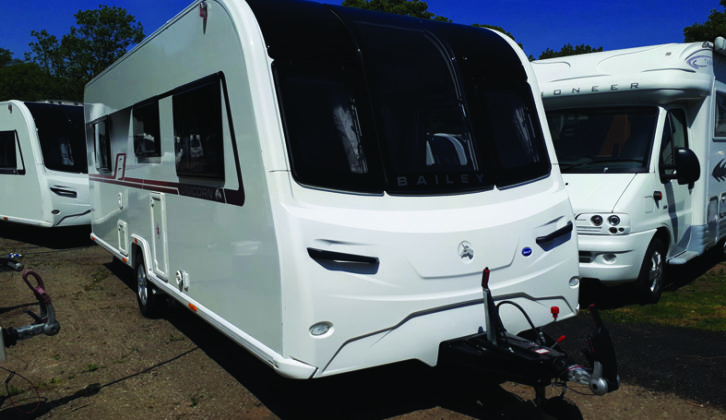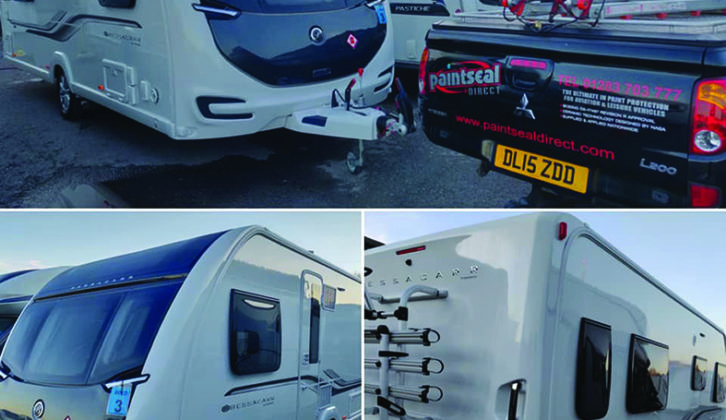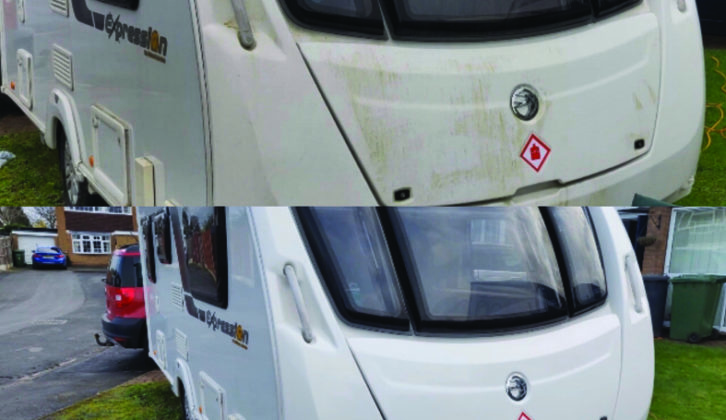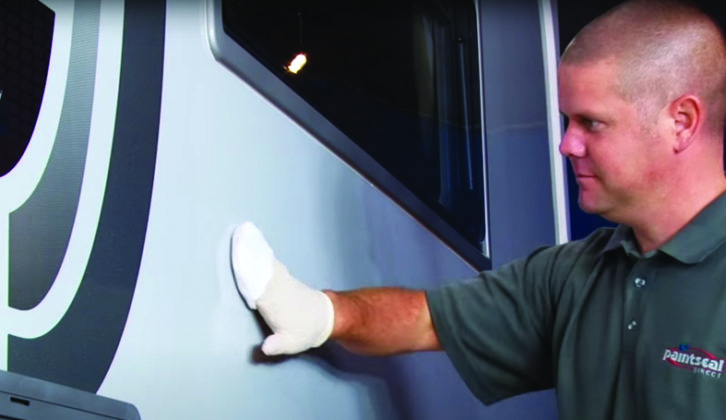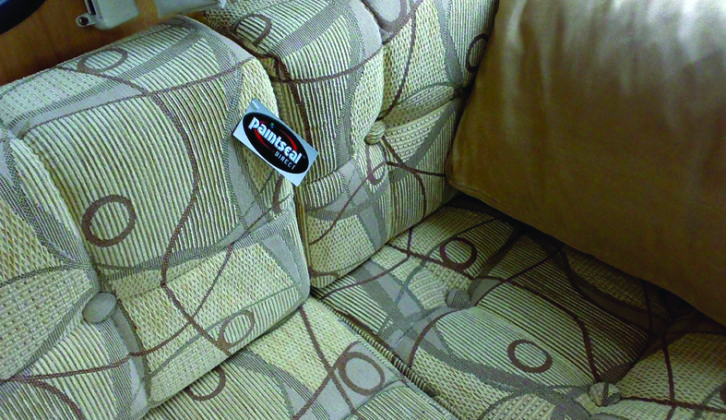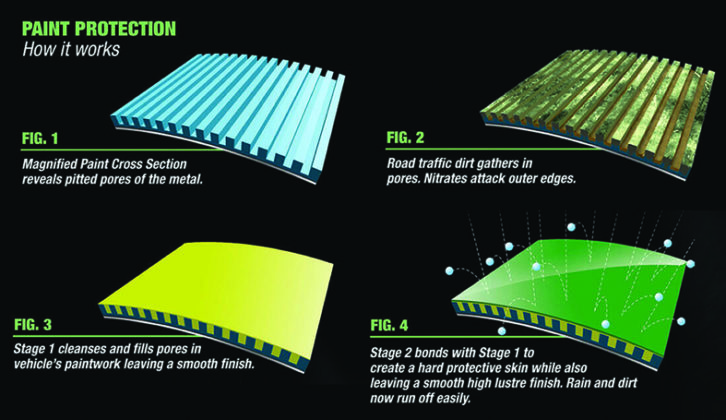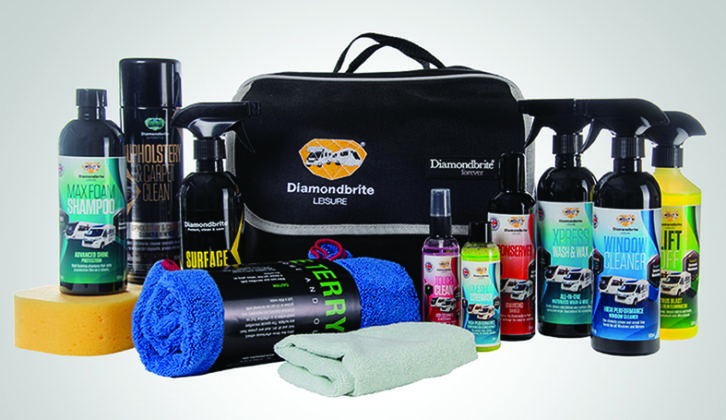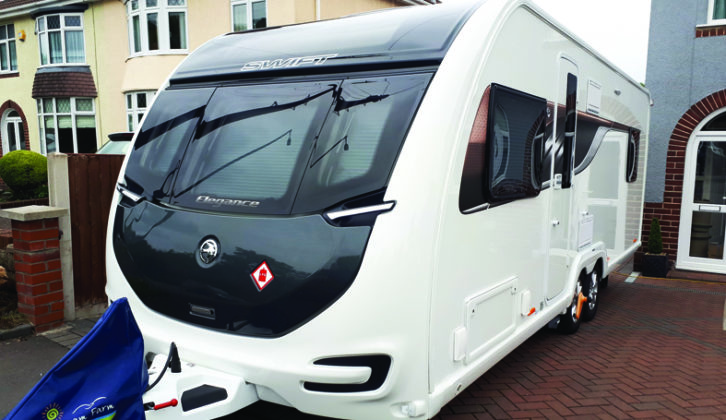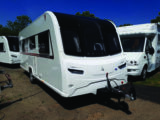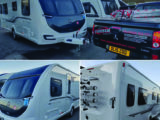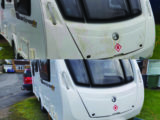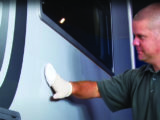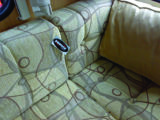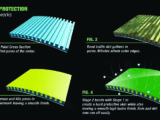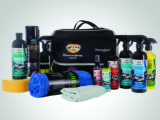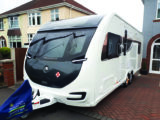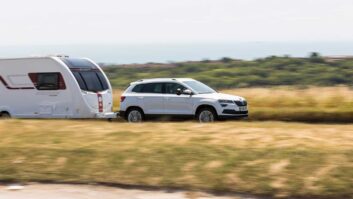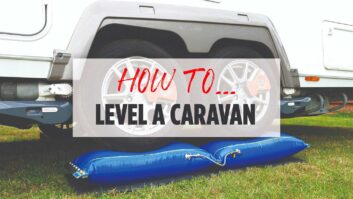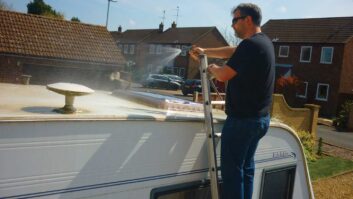If posh paint maker Farrow & Ball – famed for the creative names it gives its hues – were to describe the colour of a brand new, blindingly white caravan, it would probably be called ‘Squint’.
After two or three years, though, things inevitably change and that same tourer might then be described as ‘Overcast’, ‘Dreary’, or in a really bad case, ‘Streaky’.
Lost sparkle
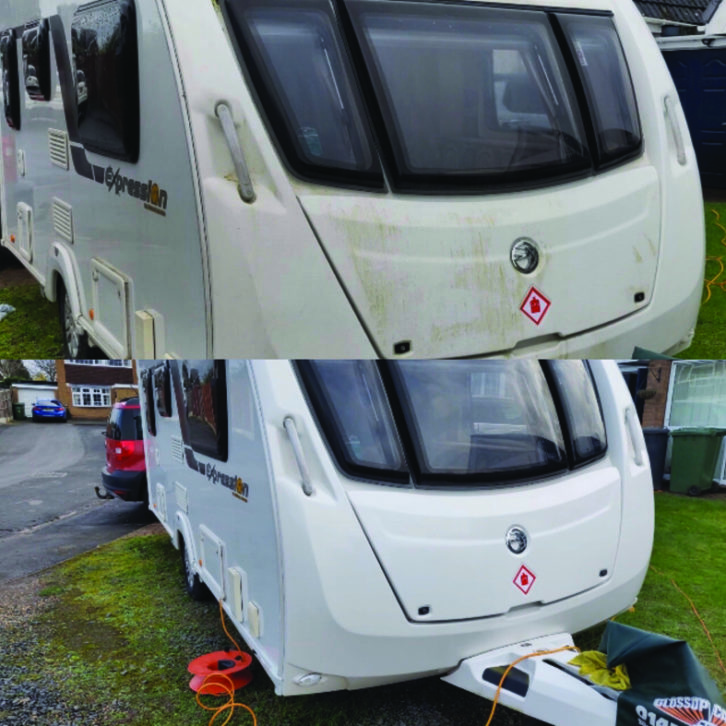
Gleaming caravans are an impressive signt, but as they get older, the sparkle is usually replaced by a light-grey tinge with vertical ‘tiger stripes’.
Maintaining the pristine whiteness of your beloved tourer can seem an impossible challenge, especially when it’s parked up over a long winter.
Regular cleaning helps, but while it can add a superficial shine, at a microscopic level, daily dust and grime, sap and bird droppings get into the paint surface’s micropores, and they’re a devil to shift.
Over time, both painted aluminium and GRP panels succumb to middle-aged greying.
Abrasive cleaners will add a temporary shine, but they work by removing a thin layer of paint with each application, so might not serve you well in the longer term.
However, there is a solution. Modern nanoceramic and Teflon finishes ‘glaze’ the surface of the panels with a tough, long-lasting coating, which resists the obvious effects of bird droppings (did you know the white part is uric acid?) and damaging sap, and the less obvious effects of UV radiation (aka sunlight).
These finishes are carefully applied by hand and fill all of the invisibly tiny cracks and crevices, resisting attack and minimising the chances of GRP panels ‘drying out’ and then becoming ‘chalky’.
These finishes are also hydrophobic, so water won’t sit on them. Instead, it beads or sheets off, eliminating any drying marks and providing an extra level of protection for your caravan.
Streaking
Black streaking is the bane of every caravanner’s life. However meticulously you clean your tourer, it always seems to come back. This is caused by oxidation of the black rubber seals as the surface layer of the seal breaks down and is carried away by rain, it forms those annoying vertical stripes.
Many caravanners spend a great deal of time scrubbing their tourer to remove these persistent black streaks, often doing yet more damage in the process because they use overly abrasive cleaning products. But by applying a protective finish early on, those stubborn streaks will wash right off.
There are many brands of protective coating available on the UK market, but two of the best known are Paintseal Direct and Diamondbrite.
Paintseal Direct
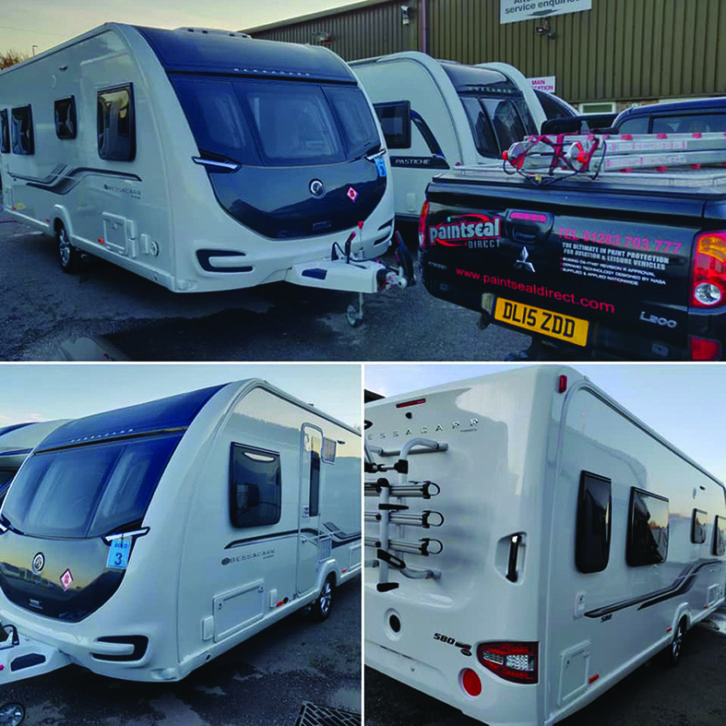
Paintseal Direct is a family business, run by the Bradburys, who have been caravanners for many years, so understand what their customers need.
The firm’s Gen-3 Glasscoat is used to protect everything from caravans and cars, to yachts and private jets. “We apply it to anything from a Bailey to a Bentley,” explains Andy Bradbury.
“Our coating is not a DIY product,” he adds. “It has to be professionally applied by a team of experts, who ensure the vehicle is properly prepped and the ceramic coating is applied to every square inch of the exterior bodywork, and the Teflon fabric finish to all of the interior upholstery.”
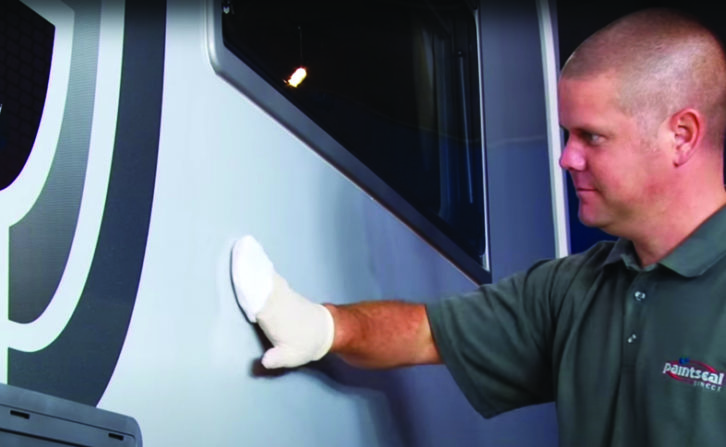
The biggest problem with protective finishes is if they’re not applied correctly, or the process is rushed.
“That’s why we only let our own team apply the Glasscoat finish. They take pride in what they do, they never cut corners. Sometimes they can spend an hour removing the wax residue from previous polishings, or excess silicone from when the vehicle was made.
“They don’t wear chains or belt buckles that might cause damage, and they open all of the windows and rooflights, to get right up to the edges.
“Ideally, a vehicle will be treated when it’s new, before it’s been washed or waxed. A dealership will contact us and one of our team will visit them to treat the caravan or motorhome. Typically, it takes four to five hours.”
After the surface has been thoroughly prepped, the liquid glass is carefully applied by hand, then polished until it achieves a high shine.
The product doesn’t mark window rubbers or handle plastics, either, as proved by professional testing that was insisted on by one major UK caravan manufacturer.
“Unlike some finishes, ours doesn’t have to be frequently reapplied; we offer a lifetime warranty. If there is even an issue, we’ll send someone out to investigate,” says Andy.
Paintseal Direct has coated almost 47,000 vehicles since it launched Glasscoat in 2006. Its liquid-glass formula works at a molecular level, to bond to the paintwork and create a glass-like finish that resists contaminants and abrasion.
The firm does about 30% of its business direct with the customer and the remainder through trusted dealerships.
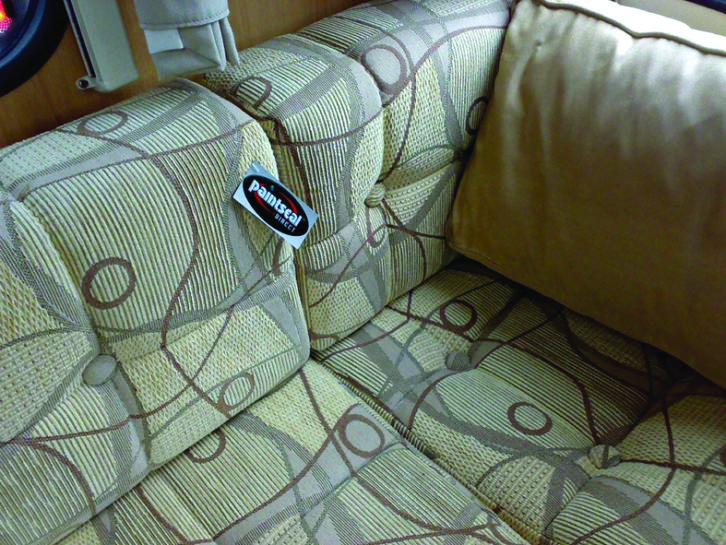
The company also provides an interior upholstery treatment for vehicles. Its Dupont Teflon fabric protector is water-based and hypoallergenic, and applied with a hand-pump rather than an aerosol spray.
The Paintseal Ceramic Gen-3 treatment (Glasscoat exterior and Teflon interior coatings) costs £499 including VAT fo a single-axle caravan, £599 for a twin-axle. Carpet protection costs £60 extra.
Diamondbrite
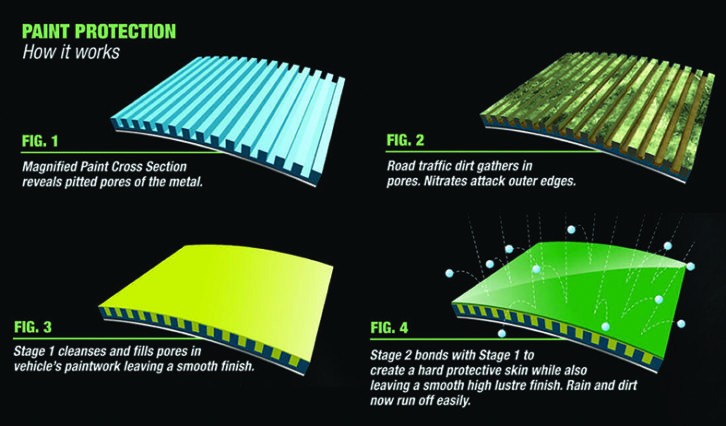
Diamondbrite is sold in DIY packs, so caravanners can save money by applying this protective coating at home.
Alternatively, having the treatment carried out by an approved professional provides a lifetime warranty.
Diamondbrite’s protective formula is made from refined rock oils, and applied in a two-stage process that results in a tough, durable high-gloss finish. Even a winter’s worth of moss growth and black streaks will wash away easily, and the protection can be enhanced from time to time using the Diamondbrite Conserver, an additive that you simply pour into your wash bucket.
The makers say Diamondbrite protects against paint-fade and damage by bird droppings (if washed off within seven days).
They add that applying their product means you’ll never have to polish your caravan again, and washing it will be much easier and quicker.
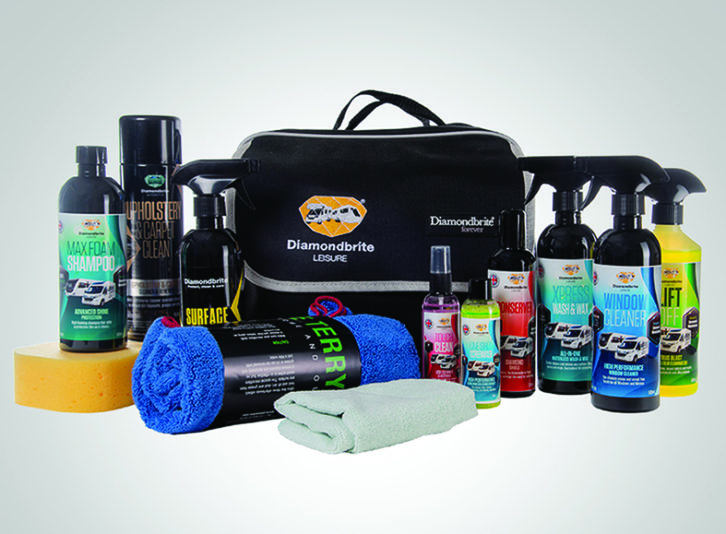
What are the benefits of applying films?
High-wear areas of your van can be shielded by a paint protection film (PPF).
So what is a PPF? It is a thermoplastic urethane film, which, when carefully applied, forms an almost invisible protective shield for your leisure vehicle’s paintwork.
Think of it as being rather like a thick, strong Cellophane. The self-adhesive film can be applied to areas of the exterior paintwork which might be in the line of fire for road muck from the tow car’s tyres, or even stone damage from the caravan’s own wheels.
Professional companies use templating software to cut the film to the exact size and shape required for any caravan panel, using large-format plotting machinery. This ensures that maximum coverage is achieved.
The receiving vehicle is then meticulously decontaminated, ready for the film to be applied. Special liquid solutions are used to aid the process and, once fitted, the film is finished with a wax or sealant.
These films are available online, but unless you are a highly competent DIYer, their application is almost certainly best left to the professionals, who can also carry out the work in a completely dust-free environment. Film is easiest to apply on flat surfaces, although the products can be contoured around curves.
PPF won’t stop damage from a rock or large road debris, but it will resist stone clippings, general road detritus and the scraping effect of hedges and foliage on a narrow road.
Many prestige and vintage cars have this product applied, and you simply can’t tell that it’s there, so it won’t affect your caravan’s good looks!

Prices vary, depending on the area you want covered, but for comparison, the front end of a large motorhome (as far back as the front doors) will cost around £1600. Key areas of a caravan’s front panel will cost a lot less than that.
The best of these films will be guaranteed for life, and the cost is probably equivalent to a good touch-up respray when you come to sell.
Pri at Leicester-based firm Reep Midlands explains: “We mainly provide protection for motorhomes, but we have done several caravans. Depending on size, I’d expect full front-panel protection to cost from £500.”
Like Reep, Pride & Joy, in Bristol, also specialises in film protection for supercars and motorhomes, so a caravan will be a doddle! Pride & Joy also offers a mobile service, so they can come to you.
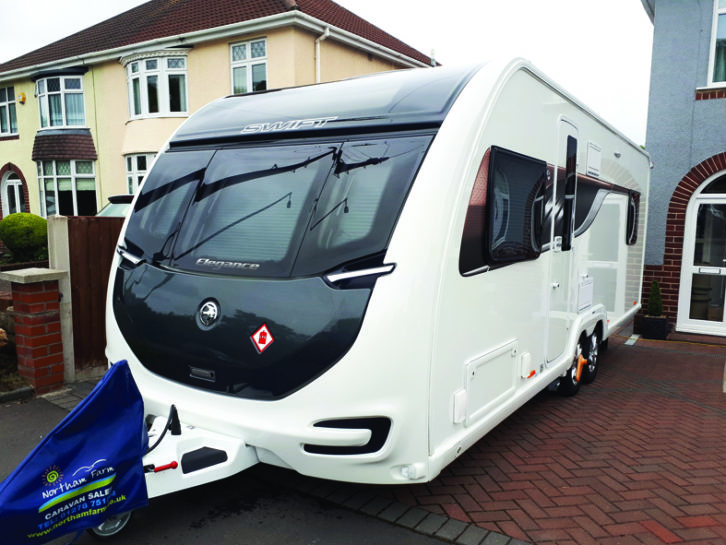
Summary
None of these paint films or finishes will come cheap, but the manufacturers believe customers will recoup that outlay, and possibly more, when it is time to sell your gleaming caravan for a higher price than an equivalent model that’s lost its sparkle.
If you liked this…. READ THESE:
How to choose the right campsite
If you’ve enjoyed reading this article, why not get the latest news, reviews and features delivered direct to your door or inbox every month. Take advantage of our brilliant Practical Caravan magazine SUBSCRIBERS’ OFFER and SIGN UP TO OUR NEWSLETTER for regular weekly updates on all things caravan related.
Future Publishing Limited, the publisher of practicalcaravan.com, provides the information in this article in good faith and makes no representation as to its completeness or accuracy. Individuals carrying out the instructions do so at their own risk and must exercise their independent judgement in determining the appropriateness of the advice to their circumstances. Individuals should take appropriate safety precautions and be aware of the risk of electrocution when dealing with electrical products. To the fullest extent permitted by law, neither Future nor its employees or agents shall have any liability in connection with the use of this information. You should check that any van warranty will not be affected before proceeding with DIY projects.
Ideally, the vehicle will be treated when it's new, before it has been washed or waxed
